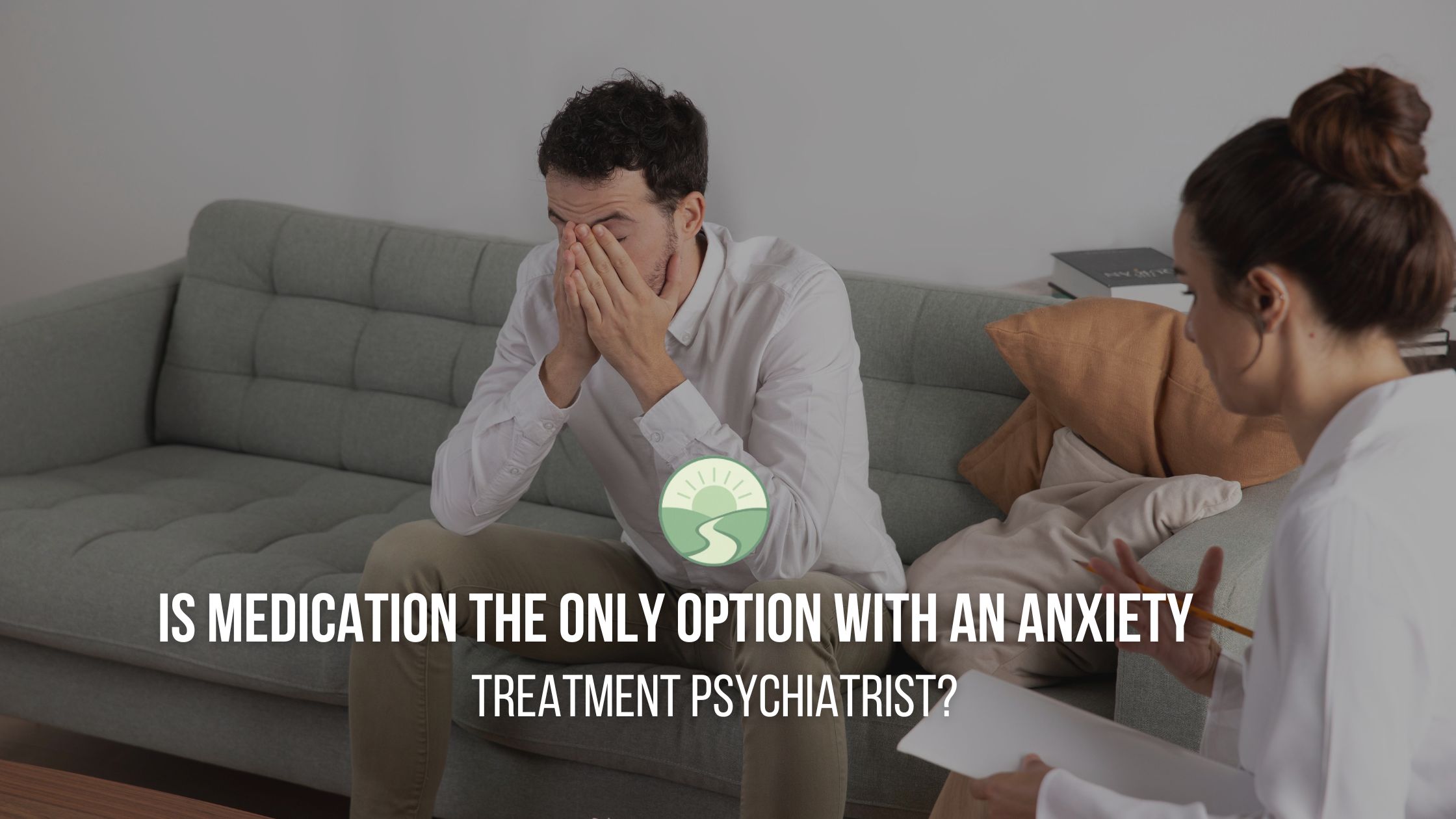When anxiety becomes persistent or starts to interfere with daily life, many people ask the same question: is medication the only option when I see an anxiety treatment psychiatrist? Short answer: no — medication is a powerful and often essential tool, but it’s rarely the only option offered by a skilled psychiatrist. In Maryland — whether you live in Rockville, North Bethesda, Baltimore, Silver Spring, Frederick, or Hagerstown — modern psychiatric care takes a layered, personalized approach that often combines medications management services with other evidence-based, non-pharmacologic supports tailored to your needs.
Below I’ll walk through what an anxiety treatment psychiatrist in Maryland typically offers, when medication is recommended, what alternatives or complements exist, and how to find the right local or virtual provider — including options for those searching “Online psychiatrist near me” or “Mental health treatment near me.”
What an anxiety treatment psychiatrist does (and why medication is one tool — not the whole toolbox)
An anxiety treatment psychiatrist Maryland residents seek is a medical doctor specialized in diagnosing and treating mental health conditions that include anxiety disorders. Because psychiatrists are physicians, they are trained to evaluate medical causes that can mimic or worsen anxiety (thyroid problems, medication side effects, substance use, etc.) and to prescribe medications when appropriate.
Key roles of a psychiatrist include:
- Conducting a comprehensive medical and psychiatric evaluation.
- Recommending and managing medication when indicated.
- Coordinating care with other health professionals and community supports.
- Monitoring safety, side effects, and treatment effectiveness over time through medications management services.
- Helping design a personalized treatment plan that may include non-medication approaches.
So while medication can be highly effective — especially for moderate to severe anxiety — psychiatrists frequently present it as one component of a broader plan.
When medication is commonly recommended
Medication may be recommended when:
- Symptoms are moderate to severe and impairing daily functioning (work, school, relationships).
- There is rapid escalation of symptoms that require faster symptom control.
- Prior non-medication approaches were insufficient alone.
- There are co-occurring conditions (for example, depression or ADHD) where a medication can address multiple symptoms.
- The psychiatrist judges that medications are likely to improve safety or quality of life.
In Maryland communities like Rockville, North Bethesda, Baltimore, Silver Spring, Frederick, and Hagerstown, psychiatrists use medications management services to safely start, adjust, and taper medications when appropriate. That ongoing management helps reduce side effects and ensures the chosen medication is helping.
Non-medication options and complements (what else works besides pills)
Even when medication is part of the plan, there are many effective non-pharmacologic options that psychiatrists can integrate into care without using the words therapy or counseling. These include:
- Skills-based programs and behavioral interventions — structured programs that teach anxiety management skills such as relaxation techniques, breathing strategies, gradual exposure to feared situations, or problem-solving skills.
- Mindfulness and stress-reduction practices — guided mindfulness routines, meditation, and breathwork can reduce physiological arousal associated with anxiety.
- Lifestyle and self-management changes — improvements in sleep hygiene, regular physical activity, balanced nutrition, and limiting caffeine or alcohol can meaningfully reduce anxiety symptoms.
- Biofeedback and physiological training — technology-assisted programs that train you to regulate breathing or heart-rate patterns.
- Structured self-help programs and digital tools — vetted apps and online programs that provide evidence-based modules for managing anxiety symptoms.
- Peer support and group-based programs — connection with others experiencing similar challenges can reduce isolation and provide practical strategies.
- Occupational and functional supports — workplace accommodations, school supports, and coaching to manage performance-related anxiety or executive functioning challenges that overlap with ADHD.
A psychiatrist who offers medications management services will often coordinate these approaches, giving patients options that go beyond medication alone.
Online psychiatrist options: why “Online psychiatrist near me” matters
Telehealth has made it easier for people across Maryland — including those in Frederick, Hagerstown, and the Baltimore metro area — to access psychiatric care. Searching “Online psychiatrist near me” often yields convenient options for initial evaluation, medication follow-up, and coordination of in-person supports when needed.
Benefits of online psychiatric care:
- Faster access for appointments and follow-ups.
- Flexibility for working adults or caregivers.
- Access to psychiatrists who specialize in specific conditions, such as anxiety with co-occurring ADHD or depression.
- Efficient medications management services via secure telehealth platforms.
If you search “Online psychiatrist near me” in your local area, be sure to confirm the psychiatrist is licensed to practice in Maryland and that the tele-visit platform follows privacy and safety standards.
How psychiatrists integrate medication and non-medication approaches in practice
A common, practical pathway a psychiatrist may follow:
- Assessment — medical history, symptom history, medication history, family history, and evaluation for medical contributors.
- Collaborative decision-making — discussing the pros and cons of starting medication versus trying non-medication options first.
- Medication trial and medications management services — if medication is chosen, the psychiatrist starts at an appropriate dose, schedules follow-up, and monitors for effectiveness and side effects.
- Layering non-medication supports — the psychiatrist recommends or refers to skills-based programs, digital tools, peer supports, or lifestyle strategies to augment medication effects.
- Re-evaluation and personalization — adjusting the plan based on response, side effects, and changing goals.
This blended approach maximizes benefit while minimizing unnecessary medication use.
Special considerations: co-occurring conditions and medication choices
For people who have anxiety plus other conditions — for example, ADHD or depression — a psychiatrist in Maryland will carefully weigh medication choices. That’s where precise phrases like “ADHD medication management near me” and “Depression treatment near me Maryland” come into practical use.
- If anxiety co-occurs with ADHD, a psychiatrist may coordinate ADHD medication management alongside anxiety-focused medications, balancing benefits and side effects.
- If depression and anxiety co-occur, certain antidepressants may help both disorders, and the medications management services will track improvement across symptom domains.
The goal is a streamlined, safe plan that treats the whole person rather than isolated symptoms.
Safety, side effects, and monitoring: why medications management services matter
Medications can be lifesaving and life-changing, but they require careful oversight. Medications management services typically include:
- Baseline medical checks and medication reconciliation.
- Education about expected benefits and potential side effects.
- Scheduled follow-ups to adjust dose or change medications.
- Clear plans for stopping medication if needed.
- Coordination with primary care providers and other specialists.
This systematic follow-up reduces risks and improves outcomes — particularly for people using multiple medications or with medical conditions.
How to choose the right local or virtual psychiatrist in Maryland
If you’re searching “Anxiety treatment psychiatrist Maryland” or “Mental health treatment near me,” here are practical tips to find a good fit:
- Check credentials and licensing — confirm the psychiatrist is board-certified or board-eligible and licensed in Maryland.
- Ask about experience — inquire if they regularly treat anxiety disorders and coordinate medications management services.
- Find out about approach — do they offer integrated plans that include skills-based programs, lifestyle changes, and digital tools alongside medication when appropriate?
- Availability and access — ask about telehealth options, appointment wait times, and emergency contact procedures.
- Location and coverage — if you prefer in-person care, look for local availability in Rockville, North Bethesda, Baltimore, Silver Spring, Frederick, or Hagerstown.
- Insurance and affordability — confirm they accept your insurance or offer sliding-scale payment options.
Searching “Online psychiatrist near me” can reveal telehealth options; searching “ADHD medication management near me” or “Depression treatment near me Maryland” can help you find psychiatrists experienced in those co-occurring conditions.
Common myths — and the evidence-based reality
Myth: A psychiatrist will push medication and nothing else.
Reality: Most psychiatrists recommend a personalized plan. Medications are important tools but are often combined with behavioral supports, lifestyle changes, and structured programs.
Myth: If I start medication, I’ll be dependent on it forever.
Reality: Some people use medication short-term to stabilize symptoms and then reduce or stop under professional supervision. Others benefit from longer-term use; that decision is individualized and monitored through medications management services.
Myth: Online psychiatrists can’t provide high-quality care.
Reality: Many psychiatrists offer excellent care via telehealth, especially for follow-ups and medications management. What matters most is licensing, experience, and a good therapeutic fit.
Practical next steps: how to prepare for a first appointment
If you decide to consult an anxiety treatment psychiatrist Maryland, here’s how to get ready:
- Make a list of your symptoms, when they started, and what makes them better or worse.
- Bring a current list of medications and medical conditions.
- Note any family history of anxiety, depression, or psychiatric medications.
- Consider whether you want in-person care in Rockville, North Bethesda, Baltimore, Silver Spring, Frederick, or Hagerstown — or if “Online psychiatrist near me” telehealth appointments are preferable.
- Be ready to discuss goals: symptom reduction, improved functioning at work/school, or better sleep, for example.
These preparations help the psychiatrist design an efficient, personalized plan that may include medications management services or alternative supports.
When to seek immediate help
If you’re feeling unable to keep yourself safe, having thoughts of harming yourself, or experiencing severe agitation or confusion, seek immediate emergency care or call emergency services. If you are in Maryland and need urgent assistance, local emergency services or a crisis line should be contacted right away. A psychiatrist is a medical doctor and can help manage risk, but urgent situations require immediate attention.
Final thoughts
Medication is a powerful tool in the hands of a skilled anxiety treatment psychiatrist Maryland residents can access, but it’s rarely the only option. The best psychiatric care is personalized — combining medications management services with skills-based programs, lifestyle changes, peer supports, and modern telehealth options when appropriate. Whether you search “Anxiety treatment psychiatrist Maryland,” “Online psychiatrist near me,” “Mental health treatment near me,” “ADHD medication management near me,” or “Depression treatment near me Maryland,” prioritize providers who offer comprehensive, coordinated care and who will work with you to create a plan that fits your life and goals.
If you live near Rockville, North Bethesda, Baltimore, Silver Spring, Frederick, or Hagerstown and are considering a first visit, look for psychiatrists who explain options clearly, monitor treatments closely, and support non-medication strategies alongside medications management services. That combination gives you the best chance of meaningful, lasting improvement — without being boxed into medication as the only path forward.
FAQs
A medical doctor who diagnoses anxiety, rules out medical causes, and provides medications management services alongside other evidence-based supports.
No — medication is one option; psychiatrists often combine medications management services with skills-based programs, lifestyle changes, and digital tools.
Search telehealth directories for Maryland-licensed providers and confirm they offer secure visits and medications management services.
Yes — many Maryland psychiatrists offer telehealth follow-ups for medication adjustments and monitoring.
Yes — search “ADHD medication management near me” to find psychiatrists experienced in coordinating treatment for both anxiety and attention differences.

